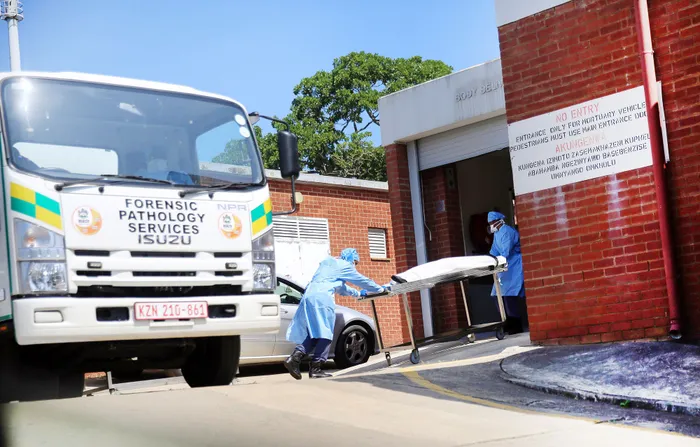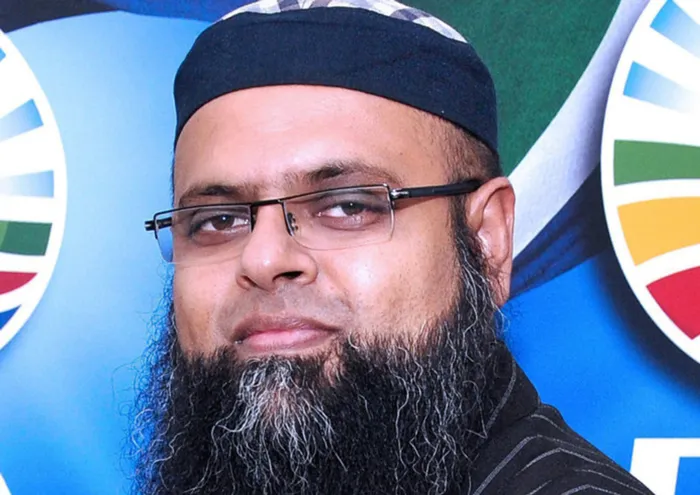KZN mortuaries in crisis: hundreds of bodies remain unclaimed for years
Slow provision and processing of DNA samples

Oversight visits reveal the challenges of managing forensic mortuaries in KwaZulu-Natal, with concerns over space and service delays.
Image: Motshwari Mofokeng / Independent Newspapers
KZN mortuaries are storing hundreds of unclaimed bodies dating back to 2012, with some from the 2021 insurrection and 2022 floods still awaiting burial. This crisis reflects a systemic failure involving the KZN Department of Health, SAPS, and municipalities, requiring urgent intervention to restore dignity to the deceased and provide closure for families, writes DR IMRAN KEEKA
HUNDREDS of bodies lying unclaimed in mortuary freezers for more than a decade.
As of April, there are bodies in freezers at the Kokstad, Ixopo, and Bulwer mortuaries dating as far back as 2012 and 2013. This is the sad reality of KwaZulu-Natal’s (KZN’s) mortuaries.
A May 2025 parliamentary reply from KZN Health MEC, Nomagugu Simelane, to questions posed by the DA, further revealed that there were 980 bodies in storage across our province at that time – a figure that is not constant and fluctuates regularly.
Media reports, after the matter was raised during a KZN Health portfolio committee, also suggested that the National Health Department’s Dr Takadu Mamashela believes this figure has since dropped to around 600.
While not implausible, this claim appears unlikely and will need to be verified with KZN’s Department of Health at the next portfolio committee meeting.
This is particularly important after MEC Simelane’s own written response confirmed: “Statistics regarding new admissions per facility, and the cumulative number of unclaimed bodies, is captured each month.”
As per a November 2024 parliamentary response, there were 1 197 unclaimed bodies at KZN’s five largest mortuaries alone – a figure that excludes those stored in smaller facilities. While the exact numbers are important, they should not distract us from the central question: Why has this pile-up of the deceased occurred in the first place?
It is equally important to note, again from the MEC’s response, that: “There are no backlogs for bodies requiring post-mortems to be conducted.”
In other words, KZN’s Department of Health (DoH) had completed its medico-legal and forensic processes.
That KZN’s mortuaries are now functioning as above-ground cemeteries is an untenable situation in the long term. When I probed the reasons for the bottlenecks last year and again this year, the responses were the same, differing only in phrasing. The causes for bodies remaining in mortuaries are depressingly familiar:
- SAPS delays in tracing next of kin
- Slow provision and processing of DNA samples
- Investigating officers taking too long to finalise pauper burial documentation - most notably the so-called “pauper statement” - without which municipalities cannot proceed with burials and;
- Municipalities citing insufficient budget allocations for pauper burials, with some reporting a lack of burial space and others not having contracted funeral undertakers to perform these services.
In summary, while KZN’s DoH has concluded its responsibilities, the SAPS is delaying matters with DNA processing and pauper statements, often due to personnel shortages and the massive DNA backlog. Municipalities, meanwhile, complain of money, space, or capacity.
On March 11, the Parliamentary Portfolio Committee Chairperson on Police, my colleague Ian Cameron, MP, received a briefing that the SAPS Forensic Science Laboratory division faced a crisis, with country-wide DNA backlogs exceeding 140 000 cases.
This is staggering. The exact current figure is something I will interrogate when next I engage Honourable Cameron. Again, this is simply stupefying that it has happened and that there is a direct knock-on effect on our staff and facilities.
To compound this tragedy, there are still bodies in KZN mortuaries from the 2021 insurrection and the 2022 floods while grieving families continue to wait for closure.
KZN’s municipalities cannot hide behind the excuse of “no space.”
More often, this is a failure of leadership and a refusal to allocate resources to ensure the dignity of the deceased. Where space is genuinely lacking, there must be a transversal engagement between KZN’s departments of Health, Cooperative Governance and Traditional Affairs (CoGTA), and municipalities - at both committee, municipal and executive level. Districts must coordinate to identify available space for burials.
While cremation may appear as a solution, religious and cultural rights must be respected.
This is a matter best placed before the South African Human Rights Commission and the Cultural, Religious and Linguistic (CRL) Commission to guide the province.
KZN’s 33 forensic pathology mortuaries have suffered almost a decade of budget cuts – much like Emergency Medical Rescue Services (EMRS). As a result, infrastructure is crumbling. Equipment is outdated. Staff and vehicles are in short supply.
The system is aged and is being stretched beyond its limits.
In Durban, the closure of the Gale Street facility was a case study in poor project execution, shifting pressure onto facilities in eThekwini and the Ugu District.
Taken together, this is a mess. It is a system teetering on collapse and it requires urgent, coordinated intervention by all stakeholders. A charted way forward is not only about improving service delivery, but also about ensuring dignity for the deceased and solace for their families.
One final point: the DoH’s schedule of charges includes a storage fee of R268 per body per day - I stand to be corrected. I am of the view that this fee should be levied against SAPS where delays are due to DNA and paperwork, and against municipalities where burials are stalled. Not to be punitive, this must form part of the discussion in a broader space that requires joint leadership.
At present, the DoH is reduced to functioning as an above-ground cemetery - an indictment on our system and a shame for all who occupy high office. KZN’s Government of Provincial Unity (GPU) - where the DA is a solid partner - is now more committed than ever to consider all options to do things differently.

Dr Imran Keeka
Image: SUPPLIED
Dr Keeka, MPL is the DA KZN spokesperson on health and the chief whip of the DA in the KZN Legislature.